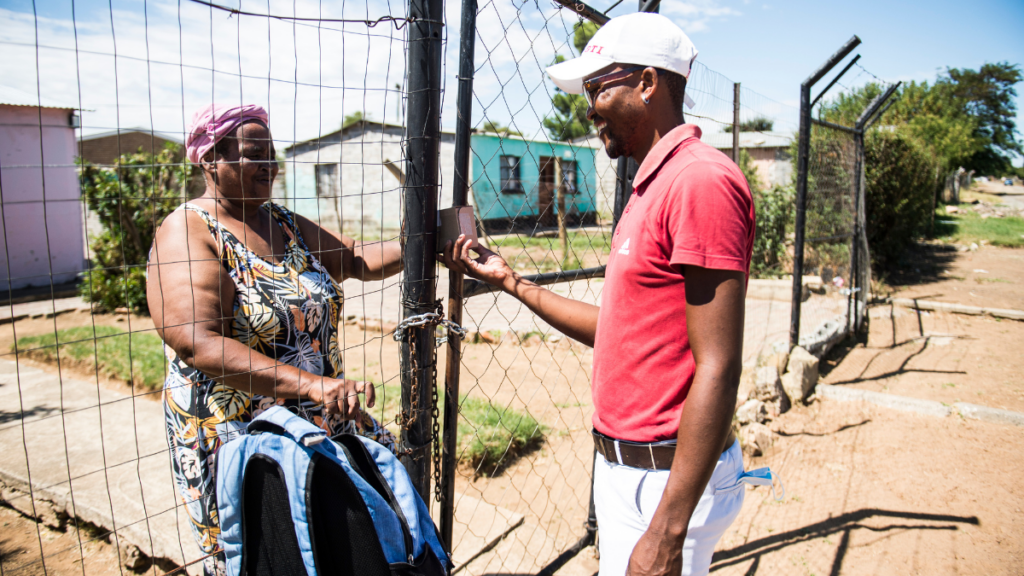- In Komani in the Eastern Cape, Siphelo Lose delivers medicine parcels by bike to people who can’t get to a clinic or private pharmacy to collect their antiretrovirals or chronic medication.
- His service, paid for by the health department and the online store Pharmacy Direct, is a lifeline.
- If patients don’t take their HIV medication every day like they should, the virus can start replicating in their body, which can make them infectious again and weaken their immune system.
- For Lose this is more than a job; it’s a calling. In this #SliceofLife, he tells us about his route and how he handles daily challenges. #SliceofLife stories are Bhekisisa’s short, first-person accounts of the experiences of some of the people we interview.
In today’s newsletter, Christina Pitt tells the story of Siphelo Lose, a cyclist who is making sure that people in his rural town get their ARVs. Sign up.

In the Chris Hani district in the Eastern Cape, where the Philani Clinic is situated, a fifth of the roughly 25 300 parcels of ARVs and chronic medication weren’t collected between January and March. Travelling far to a clinic and waiting a long time to get help discourages people from getting their medicines regularly. Despite the Central Chronic Medicines Dispensing and Distribution programme allowing patients to collect refills from a clinic for three or six months from a private pharmacy closer to where they live or work, half of the 1 387 people living with HIV surveyed in the Eastern Cape said it’s still hard for them, shows a 2023 Ritshidze report. This is partly because there aren’t enough pick-up points in some rural areas. Moreover, people can only use this service once the level of virus in their body is so low that they can no longer transmit it to someone else.
If someone with HIV misses their medication, the virus can start replicating in their body again, which weakens their immune system, makes them prone to other infections and can make someone able to transmit the virus through unprotected sex. Missed collections also make it difficult to reach UNAids targets that aim to treat 95% of people with HIV by 2030 — with South Africa still having about 27% to go before we get there. Lose’s deliveries help to prevent people from slipping through the cracks.
Here’s how Siphelo Lose uses his bicycle to change this.
“Most of the people in my township, eNkululekweni, are farm workers. They go to work very early and come home late.
“The clinic is two hours away, so they aren’t able to collect their antiretroviral (ARV) treatment.
“In the end, one person who has ARVs will sell their medication to the others, but then they don’t have enough for themselves.
“At the beginning of the year, Philani Clinic asked me to deliver people’s medication by bicycle.
“Every morning at 8am I come to the clinic to check who didn’t collect their parcel the day before. Then I call them to find out when would be the best time to deliver.
“We don’t want to see people dying when their treatment is sitting at the clinic.
“This bicycle is broken and hard to ride, but if I ask the clinic to fix the bike it would take too long and people would have to wait to get their parcels.
“Some days I walk instead, but I’m scared of dogs.
“And this is a township, so I have to watch out for pharas [criminals]. I have a rip in my bag where someone tried to cut it open.
“Today, I have three deliveries in the Mlungisi area. I get paid R7 per box marked for a home delivery.
“Last month, I got R161 for 23 parcels. So far [this month], I have delivered six boxes.

“But it’s not about the money; it’s about the people. Everyone here knows me.
“Before I worked at the clinic, I used to take people’s medicine collection cards and fetch their medication [for them].
“There are supposed to be community health workers who should check up on people if they don’t fetch their medication. But in the area where they have to work, some townships, like Komani Heights, are two hours away.
“I have a bicycle, but they have to walk. Places aren’t safe and most of them are women.
“I get tired when I make deliveries very far away, but when I arrive the patients give me water to drink.
“I do my best, even though I have nothing myself. I only have God. I pray to God every day to give me the power to help people.”
Christina Pitt is a health journalist at Bhekisisa.






